"Roses are red, violets are blue ....."
Monday, March 17, 2025
Red is rojo and blue is verde - ¿Qué?
 Our "Spanish Matters" topic today revolves around colours. Our "Spanish Matters" topic today revolves around colours.
Both English and Spanish are very "colourful" languages which use metaphors, similes and symbolism to great effect.
But they do not often correspond in the two languages.
[Image courtesy of Wild Lark]
Colours are used to describe, well, the colour of things. But they are also used figuratively to convey other meanings.
 For example, Peter is green with envy; Mary is feeling blue (sad); It was a black day for Liverpool (the "Reds") when they lost the Carabao Cup Final to Newcastle United on 16 March 2025; yellow = cowardly; and so on. For example, Peter is green with envy; Mary is feeling blue (sad); It was a black day for Liverpool (the "Reds") when they lost the Carabao Cup Final to Newcastle United on 16 March 2025; yellow = cowardly; and so on.
But are they used consistently in this way in English and Spanish? "No way, José!"
[Image courtesy of Amazon]
red/rojo
Expressions in English like "red mist", "red lines" and a "red-eye" flight do not have Spanish equivalents using the adjective rojo.
Others
 For him it's like a red rag to a bull = es lo que más le saca de quicio For him it's like a red rag to a bull = es lo que más le saca de quicio
to go into the red = contraer deudas
to go as red as a beetroot = ponerse como un tomate
reds under the bed = la amenaza comunista
caught red-handed = pillado con las manos en la masa
[Cartoon courtesy of LinkedIn]
blue/azul
Lots of terms and expressions in English, such as blue-jeans, blue joke, and blue-collar worker, do not have equivalents in Spanish using azul.
Others
a blue film = una película porno
His death came out of the blue = Su muerte cayó como una bomba
He's got the blues = Está deprimido
once in a blue moon = de Pascuas a Ramos
you can shout till you're blue in the face = puedes gritar hasta hartarte
[Image courtesy of US Adult Literacy]
 yellow/amarillo yellow/amarillo
Expressions using yellow are commonly translateable between English and Spanish.
However, the yellow press is la prensa sensacionalista and he has a yellow streak (ie is a coward) is translated as es un poco gallina (chicken) or miédica.
[Image: Adobe Stock]
green/verde

In English green often has the sense of naive or inexperienced (except in the context of gardening, eg green-fingered), whereas in Spanish it is often a pejorative adjective for a person or a thing that is sexually "dodgy".
Others:
Paqui was very green when it came to relationships with men = Paqui era muy naive .....
un viejo verde = a dirty old man
una revista verde = a porn mag
una película verde = a "skin flick" or pornographic movie
[Cartoon courtesy of Facebook]
Acknowledgements:
Adobe Stock, Amazon, Facebook, LinkedIn, US Adult Literacy, Wild Lark
© don Pablo
Tags:
16 March 2025, Adobe Stock, Amazon, as red as a beetroot, azul, black day, blue, blue-collar worker, blue film, blue in the face, blue-jeans, blue joke, Carabao Cup Final, colours, cowardly, don Pablo, English, Facebook, feeling blue, go into the red, green with envy, LinkedIn, Liverpool, metaphors, Newcastle United, "No way, José!", once in a blue moon, out of the blue, red, "red-eye" flight, "red lines", "red mist", red rag to a bull, "Reds", reds under the bed, rojo, similes, Spanish, "Spanish Matters", symbolism, the blues, US Adult Literacy, verde, Wild Lark, yellow,
áéíóú
 0
Like
Published at 5:07 PM Comments (0)
0
Like
Published at 5:07 PM Comments (0)
Moving to Spain from another country
Thursday, March 13, 2025
 Spain is now home to several million foreigners. Whether refugees from conflict zones or hostile regimes, economic migrants or as a lifestyle choice. The largest group of immigrants are the British, followed by Moroccans, Romanians, German, Dutch and French. Increasingly Americans are opting to get out of Trump’s chaotic USA and moving to Europe, in particular Spain. Spain is now home to several million foreigners. Whether refugees from conflict zones or hostile regimes, economic migrants or as a lifestyle choice. The largest group of immigrants are the British, followed by Moroccans, Romanians, German, Dutch and French. Increasingly Americans are opting to get out of Trump’s chaotic USA and moving to Europe, in particular Spain.
[Map courtesy of CaixaBank Research]
Introduction
 Don Pablo came across this article about a young Californian lady, whom he actually met two days ago. Don Pablo came across this article about a young Californian lady, whom he actually met two days ago.
Shawna Lum moved to Spain in 2015 and has lived in Bilbao, Barcelona and now has her eyes on the Ronda area.
View of Barcelona with Gaudí's Sagrada Familia [Barceló]
Don Pablo has left the article in its original Spanish. Many of you who are learning Spanish should be able to understand it. If not, there’s always Google Translate and at some point soon the article will be posted in English on another blog.
Una estadounidense se muda a España y señala lo que menos le gusta de nuestro país: “Nada es perfecto”
Beto V. Álvarez
Shawna Lum pasó muchos años en Estados Unidos, pero se sentía frustrada con su trabajo, por lo que decidió mudarse a Barcelona y comenzar una nueva vida.
 Mudarse a otro país nunca es sencillo. Acostumbrados a un estilo de vida y a unas condiciones muy concretas, ir a vivir a otro país nos obliga a adaptarnos a una cultura ajena y a una forma de comprender la vida distinta. Mudarse a otro país nunca es sencillo. Acostumbrados a un estilo de vida y a unas condiciones muy concretas, ir a vivir a otro país nos obliga a adaptarnos a una cultura ajena y a una forma de comprender la vida distinta.
Así le ha ocurrido a la estadounidense Shawna Lum. Nacida y criada en Los Ángeles, la joven se mudó en el año 2015 a Bilbao, y ha notado algunas cosas de España que no le gustan, como bien ha explicado a través de su cuenta de Instagram, @shawnalumm.
Shawna Lum [Foto: MSN]
Si bien ella está muy satisfecha con Bilbao, la vida en España tiene algunas particularidades que pueden ser muy molestas para los extranjeros. Como la falta de “infraestructuras de calidad”.
La joven, de 31 años, asegura que en nuestro país hay muchos edificios antiguos que tienen una infraestructura “pobre”, lo que provoca, por ejemplo, muy poco aislamiento frente al frío o frente al ruido de la calle.
Al vivir en Bilbao, el tiempo también le ha jugado una mala pasada. Acostumbrada al clima soleado de Los Ángeles, a Shawna no le gusta el clima extremo que azota al País Vasco durante el invierno, marcado por un “frio gélido”.
“Esto es típicamente más complicado para las chicas que les gusta los climas cálidos, como a mí”, confiesa la joven.
Pese a ser mundialmente famosos por nuestra gastronomía, el sector de la hostelería presenta muchas deficiencias. O así lo considera Shawna, que asegura que los camareros a veces “no prestan atención a los clientes, dejando platos en la mesa o contestándote de mala manera cuando pides demasiado”.
Por último, la falta de puntualidad del transporte público es un problema muy frecuente en la vida de Shawna, y “pone a prueba tu paciencia” todos los días.
Una gran calidad de vida
 Pese a todo, Shawna admite que la vida en España es mucho mejor que la vida que tenía cuando vivía en Los Ángeles. Pese a todo, Shawna admite que la vida en España es mucho mejor que la vida que tenía cuando vivía en Los Ángeles.
Para ella, “lo bueno supera a lo malo”, y su vida en España le ha ayudado a mejorar su vida y reducir significativamente “su estrés”.
“Nada es perfecto. Sigo recomendando mudarse a Madrid. Mi vida es muchísimo mejor”, confiensa la joven.
Shawna Lum settled in Spain [@shawnalumm]
© don Pablo
Fotos:
@shawnalumm, Barceló, CaixaBank Research, MSN
Gracias a:
AS, Beto V Álvarez, Paul Whitelock
Tags:
@shawnalumm, acostumbrada al clima soleado, Americans, another blog, AS, Barceló, Barcelona, Beto V Álvarez, Bilbao, British, CaixaBank Research, calidad de vida, California, conflict zones, don Pablo, Dutch, economic migrants, edificios antiguos, el clima extremo, España, estadounidense, estilo de vida, estrés, extranjeros, falta de puntualidad del transporte público, French, frente al ruido de la calle, Germans, Google Translate, hostile regimes, in English, “infraestructuras de calidad”, Instagram, ir a vivir a otro país, la hostelería presenta muchas deficiencias, largest group of immigrants, la vida en España, la vida en España es mucho mejor, lifestyle choice, “lo bueno supera a lo malo”, Los Ángeles, MSN, Moroccans, moving to Europe, moving to Spain, mudarse a otro país, mudarse a Madrid, muy poco aislamiento frente al frío, “nada es perfecto", “no prestan atención a los clientes, nuestra gastronomía, País Vasco, Paul Whitelock, “pone a prueba tu paciencia”, refugees, Romanians, Ronda, se mudó a Bilbao, several million foreigners, Shawna Lum, Spain, Trump’s chaotic USA, una infraestructura “pobre”, una mala pasada, una nueva vida, un “frio gélido”, Vizcaya
áéíóú
 0
Like
Published at 4:26 PM Comments (0)
0
Like
Published at 4:26 PM Comments (0)
A country divided by its accents
Wednesday, March 12, 2025
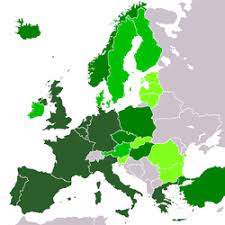 Which country am I talking about? Spain, France, Germany, the UK? Which country am I talking about? Spain, France, Germany, the UK?
Well, all four of them, in fact.
Let's take a look:
[Map courtesy of Wikipedia]
USA v UK
 They say that the USA and the UK are two countries divided by the same language. To some extent that’s true, particularly when it comes to vocabulary, eg hood v bonnet; trunk v boot; john v toilet. But we get by. They say that the USA and the UK are two countries divided by the same language. To some extent that’s true, particularly when it comes to vocabulary, eg hood v bonnet; trunk v boot; john v toilet. But we get by.
Americans from different parts of that huge country sometimes also have problems understanding each other.
[Image courtesy of X]
UK
Other countries have accents too.
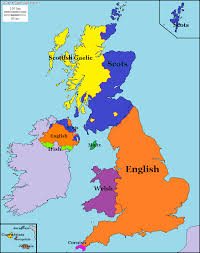 In the UK, Glaswegians are incomprehensible to all but other Glaswegians! In the UK, Glaswegians are incomprehensible to all but other Glaswegians!
Southerners have difficulties with Scouse (Liverpool) and Geordie (Newcastle-upon-Tyne).
When we were students back in the 1970s my pal Mel from Belfast spent some time with me and my family in Devon. He didn’t understand a word all week!
On top of that the revival in interest in Celtic languages, like Scots Gaelic, Welsh and Manx (Isle of Man), means that there are areas of Scotland and Wales where the language of instruction in schools is their version of Celtic.
[Map courtesy of SB Language Maps]
Spain
No Spaniard understands an andaluz.
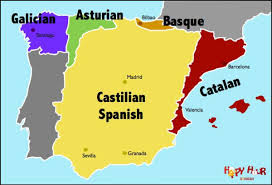 Because there has been a revival of several regional languages, that can also be a problem. Because there has been a revival of several regional languages, that can also be a problem.
Many catalanes refuse to speak castellano to Spaniards from elsewhere.
The Basque language euskera is incomprehensible to a Spanish-speaker.
Other approved regional languages such as gallego, asturiano, valenciano and balear (both dialects of catalán) are also anathema to Castilian-speakers.
[Linguistic map of Spain courtesy of Maps Spain]
Germany
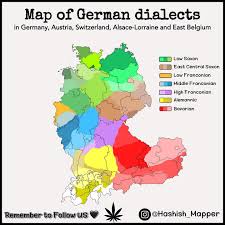 In the third-largest western European country (after France and Spain) I defy a speaker of Hochdeutsch from Hanover to understand an inhabitant of Baden-Württemberg, where Badisch and Schwäbisch rule the roost. In the third-largest western European country (after France and Spain) I defy a speaker of Hochdeutsch from Hanover to understand an inhabitant of Baden-Württemberg, where Badisch and Schwäbisch rule the roost.
The accent in Bavaria is also demanding, but if you cross the border into Austria or Switzerland, you will have even bigger problems.
Swiss German is generally not understood by Germans.
Austrian German also presents some challenges.
[Map courtesy of Instagram]
France
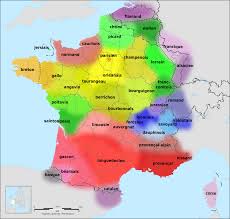 The biggest and most populous western European country also has regional accents, as you would expect. The biggest and most populous western European country also has regional accents, as you would expect.
In Brittany the locals speak a form of Gaelic, which has nothing in common with French.
Southern French (spoken in le midi) is markedly different to Parisan French.
In Alsace, German is still spoken by older inhabitants, as this region has switched back and forth between France and Germany throughout history. It switched back to France after the Second World War.
The area known as the Languedoc, has a very strong accent, la langue d’Oc.
[Regional dialects/languages of France: Wikipedia]
A personal view
A language is for communication at a higher level than our nearest animal cousins, gorillas, are able to manage.
If the language/accent varies a bit from region to region, that’s logical, but we should be able to overcome that.
 I studied Spanish and German to Honours degree level. I was a languages teacher for 15 years. After that I was a local authority languages adviser and OFSTED inspector. I studied Spanish and German to Honours degree level. I was a languages teacher for 15 years. After that I was a local authority languages adviser and OFSTED inspector.
When I moved to Spain, to Andalucia, I wondered what I’d let myself in for, since andaluz bears little resemblance to the castellano I had learned.
When I visit Germany with my German wife, we invariably go to Baden-Württemberg, where both Badisch and Schwäbisch are totally different to the Hochdeutsch I had learned.
[Photo courtesy of The Guardian]
16 years on and I have gotten used to both andaluz and Schwäbisch, although Swiss German remains a mystery.
Conclusion
I cannot str ess how important it is make the effort to learn some of the language of the country you emigrate to. The quality of your life will only be enhanced. ess how important it is make the effort to learn some of the language of the country you emigrate to. The quality of your life will only be enhanced.
And, in terms of travel, because I speak fluently the languages of the two greatest colonial nations, namely England and Spain, that gives me access to most of the world. German helps a lot in Eastern Europe and French is still spoken around the world.
[Image courtesy of News-Medical]
I don’t speak Russian, Korean nor Chinese, but as I don’t plan to go to any of those countries, I should be alright linguistically.
© don Pablo
Images:
Instagram, Maps Spain, News-Medical, SB Language Maps, The Guardian, Wikipedia, X
Acknowledgements:
don Pablo, Instituto Cervantes, Paul Whitelock, "Spanish Matters"
Tags:
a country divided by its accents, Alsace, American, Andalucia, andaluz, asturiano, Austria, Austrian German, Baden-Württemberg, Badisch, balear, Basque, Bavaria, Belfast, Brittany, castellano, Castilian-speakers, catalanes, Celtic, Celtic languages, Chinese, colonial nation, communication, Devon, don Pablo, Eastern Europe, English, euskera, French, Gaelic, gallego, Geordie, German, German wife, Germany, Glaswegian, gorillas, Hanover, he didn’t understand a word all week, Hochdeutsch, Honours degree level, hood v bonnet, Instagram, Instituto Cervantes, Isle of Man, john v toilet, Korean, la langue d’Oc, language, language of instruction in schools, languages teacher, Languedoc, le midi, Liverpool, local authority languages adviser, Manx, Maps Spain, Mel, Newcastle-upon-Tyne, News-Medical, OFSTED inspector, Parisan French, Paul Whitelock, regional languages, Russian, SB Language Maps, Scotland, Scots Gaelic, Scouse, Spain, Spaniard, Spanish, "Spanish Matters", Spanish-speaker, Schwäbisch, Second World War, Southerners, strong accent, Swiss German remains a mystery, Switzerland, The Guardian, the USA and the UK are two countries divided by the same language, trunk v boot, UK, USA, valenciano, Wales, Welsh, Wikipedia, X
áäéíóöúüàçèê
 0
Like
Published at 7:28 AM Comments (1)
0
Like
Published at 7:28 AM Comments (1)
Spam post or Abuse? Please let us know
|
|